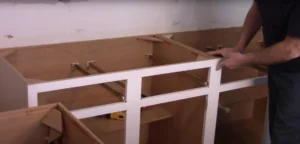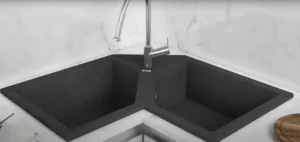Are you tired of your old kitchen countertops but love your cabinets? You’re not alone. Many homeowners want to freshen up their kitchen without a full remodel. The good news is, that you can replace countertops without replacing cabinets.
This option saves money and time while giving your kitchen a new look.
Granite countertops are a popular choice for their beauty and durability. They resist heat and scratches, making them ideal for busy kitchens. Our guide will walk you through the process of replacing your countertops.
We’ll cover what to consider and how to ensure a smooth installation. Ready to transform your kitchen? Let’s get started.
Key Takeaways
- You can replace countertops without changing cabinets, saving time and money.
- Check if your cabinets can support new countertop materials, especially heavy ones like granite.
- Hire professional installers to ensure proper fit and protect existing cabinets during installation.
- Choose countertop materials that match your cabinet style, kitchen design, and daily use needs.
- Protect cabinets during installation by covering surfaces and removing hardware to avoid damage.
Is It Possible to Replace Countertops Without Replacing Cabinets?
Yes, you can replace countertops without changing cabinets. This option saves money and time for many homeowners. Old cabinets often stay strong enough to hold new counters. But, you need to check if your cabinets can support the weight of new materials.
Some countertops, like granite or quartz, are heavier than others. A pro can tell you if your cabinets are ready for an upgrade. They’ll look at the structure and suggest the best options for your kitchen.
Factors to Consider Before Replacing Countertops
Before you swap out your countertops, take a close look at your current setup. You’ll need to check a few key things to make sure your new counters will fit and look great.
Structural integrity of existing cabinets
Existing cabinets must be strong to hold new countertops. This is key for a safe and lasting kitchen update. Granite and quartz are heavy materials that need solid support. Your current cabinets should be checked for any weak spots or damage before you start.
A pro can tell if your cabinets can handle new counters. They’ll look at the frame, joints, and base. Level cabinets are also crucial for a smooth install. Uneven surfaces can cause gaps or cracks in your new countertop.
Getting this right helps avoid costly fixes later on.
Compatibility of countertop material
Picking the right countertop material is key for a smooth kitchen update. Not all materials work with every cabinet type. Granite and quartz are heavy, so your cabinets must be strong enough to hold them.
Lighter options like laminate or solid surface might be better for older cabinets. Check that your new countertop thickness matches your cabinet height too. This ensures a good fit and avoids gaps or uneven surfaces.
Your new counters should also match your kitchen’s style. Think about color, pattern, and texture when choosing. A sleek, modern countertop might look odd with rustic cabinets. The same goes for a country-style counter on modern cabinetry.
Your backsplash matters too. Make sure your new countertop complements it well. If you’re unsure, ask a pro for advice on what works best in your space.
Tips for a Successful Countertop Replacement
Replacing countertops can be tricky, but a few tips can make it smoother. Hiring skilled installers and shielding your cabinets during the process are key steps. These pros will ensure a perfect fit and protect your existing setup.
Hire professional installers
Professional installers are key to a smooth countertop swap. They have the skills to handle heavy materials and protect your cabinets. These experts know how to fit new counters without damaging what’s underneath.
They’ll make sure everything lines up just right.
Hiring pros can save you money in the long run. They’ll catch problems early and fix them fast. Plus, they have the right tools for the job. This means less stress for you and better results in your kitchen or bath.
Good installers will also clean up after themselves, leaving you with a fresh new look.
Protect cabinets during installation
Once you’ve hired skilled workers, it’s time to shield your cabinets. Protecting your cabinets during countertop installation is key. You don’t want to damage your existing units while putting in new surfaces.
Cover all cabinet surfaces with thick blankets or moving pads. This guards against scratches, dents, and other harm. Tape plastic sheeting over cabinet doors and drawers to keep out dust and debris.
Remove hardware like knobs and pulls to avoid damage. Place plywood on the floor to prevent scratches from heavy tools or materials. These steps help ensure your cabinets stay in top shape during the update.
With proper care, you can enjoy new counters without harming your current cabinets.
Kitchen Cabinet and Countertop Remodel Considerations
Kitchen remodels need careful planning. Your cabinets and countertops must work well together. Think about the overall look you want. Choose materials that match your style and budget.
Natural stone counters like granite or marble can be heavy. Make sure your cabinets can support their weight. If not, you may need to strengthen them first.
Color and texture are key in your kitchen design. Pick countertops that go well with your cabinet color. Light counters can brighten a dark kitchen. Dark counters add drama to light cabinets.
Don’t forget about durability. Some materials resist stains and scratches better than others. This matters if you cook a lot. Ask pros about the best options for your needs. They can help you create a kitchen you’ll love for years.
Next, we’ll wrap up with some final thoughts on replacing your countertops.
Conclusion
Replacing countertops without changing cabinets is often possible and cost-effective. It can give your kitchen a fresh look without a full remodel. It’s important to check your cabinet strength and choose the right countertop material.
Hiring professionals helps ensure a smooth installation and protects your cabinets. With careful planning, you can enjoy new counters while keeping your current cabinets intact.
Effective Kitchen Remodeling: Key Takeaways on Countertop Replacement
1. Can I replace my kitchen countertops without getting new cabinets?
Yes, it’s possible to replace countertops while keeping your current cabinets. This option saves money and time compared to a full kitchen remodel. You can update your kitchen’s look without the hassle of cabinet replacement.
2. How do I replace countertops without damaging the cabinets underneath?
To replace countertops without damaging the cabinets, start by carefully removing the old surface. Then, prep the base cabinets for the new material. Make sure the lower cabinets can support the weight of the new countertops, especially if switching to heavier options like granite slabs.
3. Will my existing cabinets support new, heavier countertops?
Your existing cabinets may support heavier countertops, but it’s crucial to check. Some older cabinets might need reinforcement to hold materials like granite or quartz. A professional can assess if your kitchen cabinetry is structurally sound enough for the new weight.
4. Can I keep my current sink and faucet when replacing countertops?
Often, you can reuse your current sink and faucet when putting in new countertops. However, this depends on the condition and compatibility of these fixtures. Sometimes, it’s best to update everything for a cohesive look and to avoid future issues.
5. Is it cheaper to replace just the countertops instead of doing a full kitchen renovation?
Replacing only the countertops is usually cheaper than a full kitchen overhaul. It’s a great way to refresh your kitchen’s appearance without the expense of new cabinets. This route can bring your dream kitchen closer to reality while staying budget-friendly.
6. How long does it take to replace countertops while keeping the cabinets?
The process of replacing countertops while keeping cabinets typically takes 2-3 days. This includes the removal of old counters, preparation of cabinets, and installation of new surfaces. The timeline may vary based on the material chosen and the size of your kitchen.





